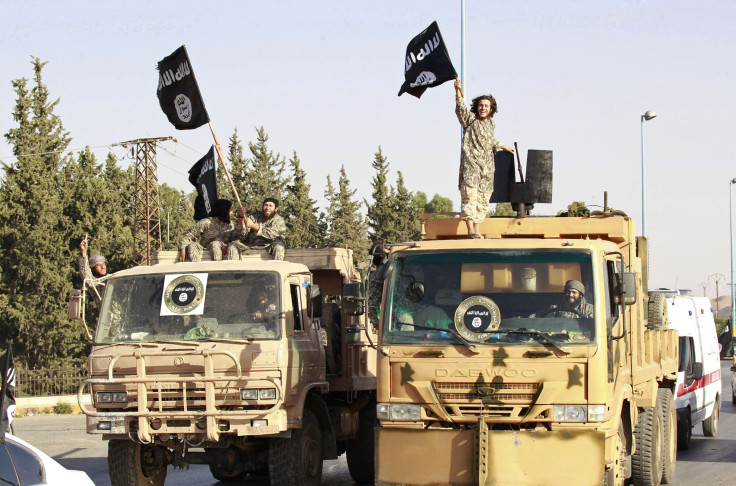Why ISIS Wants Saudi Arabia, But The Kingdom May Be The Islamic State's Most Difficult Acquisition

Although it may be the Islamic State group’s most coveted target, experts agree that Saudi Arabia is not likely to become the next Iraq or Syria. While ISIS ideology and some fighters have quietly trickled into the 90 percent Sunni country, oil-rich and U.S.-friendly Saudi Arabia may be the militant jihadist group’s most difficult border to breach.
Saudi Arabia is an active member of the U.S.-led anti-ISIS coalition, a longtime and very wealthy U.S. ally, and the Middle East's Sunni powerhouse. Islamic State leader Abu Bakr al-Baghdadi described the country as the “head of the snake and stronghold of disease.”
Saudi Arabia is, however, the birthplace of ISIS’ particular brand of Wahhabi-Salafist Sunni Islam. Aside from the religious appeal, it is also the largest producer and exporter of oil, averaging 8 million barrels per day. If Islamic State militants seized oil production facilities or Saudi Arabia’s more than 260 billion barrels of proven reserves, it would be a momentous shift in world affairs.
There is no doubt that Islamic State fighters have a presence in the country. The militant group reportedly released a video Tuesday, claiming to show the killing of Danish national Thomas Hoepner in Saudi Arabia. Saudi officials arrested 77 suspected ISIS members responsible for an attack that left seven Shiites dead, according to a spokesman for the Ministry of Interior. In May, 62 suspected members of an Islamic State cell were arrested in the southern city of Abha; two months later the Saudi government deployed security forces on the Iraqi border to curb militant activity.
These seemingly random, sporadic attacks are all part of ISIS’ strategy in Saudi Arabia. In a rare audio recording, al-Baghdadi called on Saudi Islamic State supporters to "embitter their lives and make them occupied with themselves instead of us." In other words, he wants ISIS' Saudi supporters to deteriorate the government from inside the country, helping to erode support for the monarchy and convince people that it is in their interest to pledge allegiance to the caliphate.
“If anything, I expect that ISIS will sponsor guerilla attacks in [Saudi Arabia]. And guerilla-style warfare, while still a risk, is more anonymous for individual members than professional military operations,” Harleen Gambhir, counterterrorism analyst at the Institute for the Study of War, said.
ISIS was able to expand in Iraq and Syria largely by appealing to existing disaffected populations who had long been mistreated by their government. Saudi Arabia has no shortage of unhappy residents, but the country’s ruling House of Saud is infamous for brutal crackdowns at the very whiff of uprising or ill intent toward the government. Saudis barely raised a finger in protest while several other Middle Eastern authoritarian governments shook or crumbled during the Arab Spring.
“ISIS has been thriving in areas where governance is very weak or collapsed, and that's not the case in Saudi Arabia,” Matthew Waxman, an adjunct senior fellow for law and foreign policy at the Council on Foreign Relations, said. “The Saudi government was quite effective in combating al Qaeda, and its record during the past decade suggests that it is not nearly as susceptible to the ISIS threat as other countries in the region.”
Despite strict government control, ISIS ideology has spread among disaffected members of Saudi society who opted to leave the country. The highest number of foreign fighters, at least 2,500 as of May, who went to Syria to fight with jihadists was from Saudi Arabia, and at least 500 went to Iraq, according to a report from The Soufan Group.
“For a person who really believes in ISIS ideology, the question is not whether ISIS is a good enough reason to risk harm but whether they will face that risk in Iraq and Syria or in Saudi Arabia,” Gambhir said. “A Saudi extremist who's willing to risk life and limb and is not tied to their community would likely choose to emigrate across the border to fight in Iraq.”
An estimated 300 fighters have returned from Iraq and Syria to Saudi Arabia and undergone the government’s “counseling and care” program, which is like rehab for jihadists, according to The Soufan Group. Of the 2,500 people who participated in the program over the past two years, 12 percent have “relapsed,” Ministry of Interior spokesman Maj. Gen. Mansour Al-Turki said last week. Relapsed fighters become a risk for Saudi Arabia’s national security and could carry out lone wolf attacks inside the country, which is a huge part of ISIS strategy in Saudi.
“Bottom line is, we're not going to see an ISIS-led land invasion of Saudi Arabia,” Gambhir said. “What we might see is more direct support of ISIS-supporting elements in the country and coordinated efforts to distract Saudi security forces from events in Iraq.”
© Copyright IBTimes 2024. All rights reserved.






















